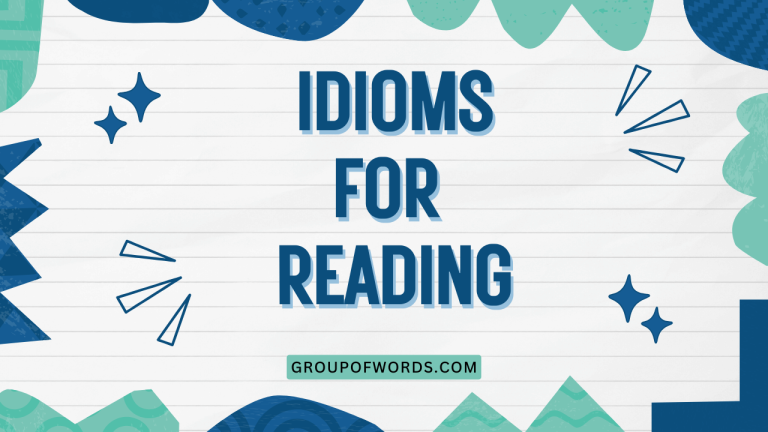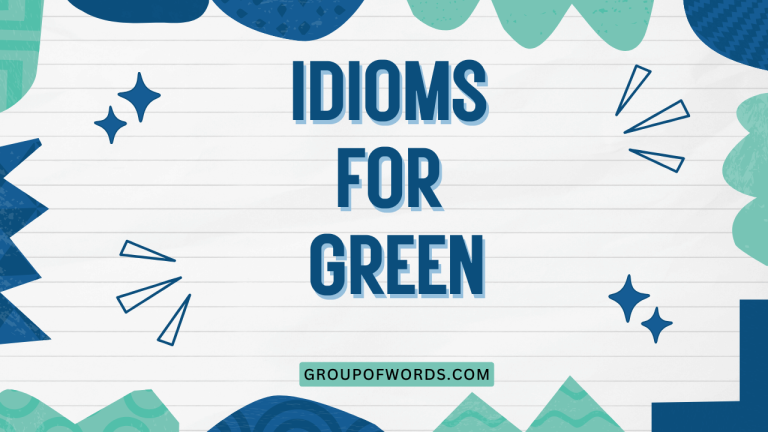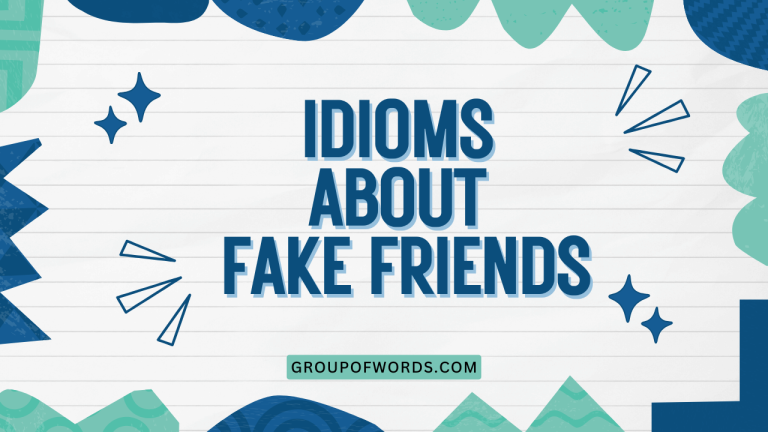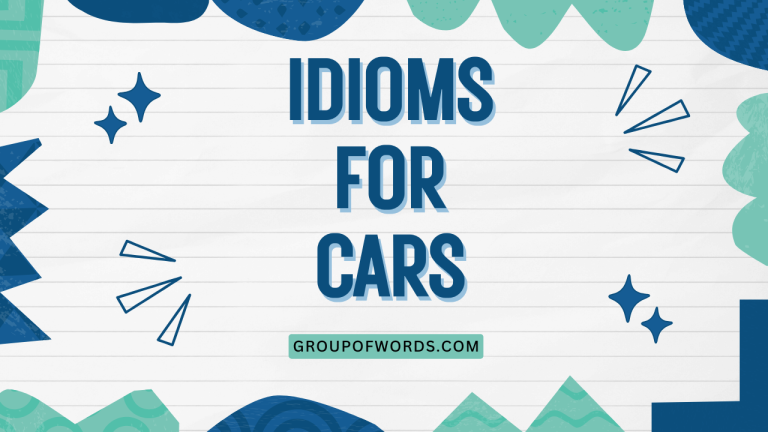Idioms for Excitement: Expressing Enthusiasm in English
Understanding idioms is crucial for mastering English, as they add color and depth to everyday conversation. Idioms related to excitement are particularly useful for conveying enthusiasm and passion.
This article will explore a variety of idioms used to express excitement, providing definitions, examples, and usage tips. Whether you’re an English language learner or a native speaker looking to expand your vocabulary, this guide will help you express yourself more vividly and accurately.
Table of Contents
- Introduction
- Definition of Idioms for Excitement
- Structural Breakdown of Idioms
- Types or Categories of Excitement Idioms
- Examples of Idioms for Excitement
- Usage Rules for Excitement Idioms
- Common Mistakes When Using Excitement Idioms
- Practice Exercises
- Advanced Topics: Nuances and Regional Variations
- FAQ
- Conclusion
Introduction
Idioms are phrases or expressions whose meanings cannot be understood from the literal meanings of the individual words. They add flavor and personality to the English language and are frequently used in both spoken and written communication.
Learning idioms for expressing excitement is particularly valuable because it allows you to convey emotions more effectively and connect with others on a deeper level. This article will delve into various idioms that capture the feeling of excitement, providing you with the knowledge and tools to use them confidently and appropriately.
By understanding these idioms, you can enhance your communication skills and better appreciate the richness of the English language. This guide is designed for English language learners of all levels, as well as native speakers who wish to refine their expressive capabilities.
Definition of Idioms for Excitement
Idioms for excitement are expressions that describe a state of intense enthusiasm, eagerness, or anticipation. These idioms go beyond simple statements of happiness; they convey a deeper sense of emotional arousal. They often use figurative language and imagery to paint a vivid picture of the feeling of excitement. These idioms are classified as figurative language and function as adverbs or adjectives in sentences, modifying verbs or nouns to describe the intensity of the feeling. The context in which these idioms are used is typically informal or conversational, although some may be appropriate in certain types of formal writing. Understanding the underlying meaning and cultural context of these idioms is crucial for using them correctly.
Structural Breakdown of Idioms
The structure of idioms can vary widely, but they generally consist of a combination of words that, when taken literally, do not convey the intended meaning. Idioms often involve metaphors, similes, or other figures of speech. For example, the idiom “on cloud nine” uses the metaphor of being high in the sky to represent a state of extreme happiness. The individual words “on,” “cloud,” and “nine” do not, on their own, suggest excitement, but together they form a well-understood expression. Many idioms follow common grammatical patterns, such as prepositional phrases (e.g., “over the moon”), verb phrases (e.g., “jump for joy”), or adjective phrases (e.g., “thrilled to bits”). Recognizing these patterns can help you understand and remember idioms more easily. The key is to understand the entire phrase as a single unit of meaning, rather than trying to analyze the individual words.
Types or Categories of Excitement Idioms
Idioms for excitement can be categorized based on the specific type of excitement they convey. Here are some common categories:
Idioms Expressing Anticipation
These idioms describe the feeling of looking forward to something with excitement and eagerness. They often involve a sense of waiting and expectation.
Idioms Expressing Joy and Happiness
These idioms convey a sense of pure happiness and delight. They often involve physical expressions of joy, such as jumping or smiling.
Idioms Expressing Eagerness
These idioms describe a strong desire to do something or experience something. They often involve a sense of impatience and enthusiasm.
Idioms Expressing Nervous Excitement
These idioms capture the feeling of excitement mixed with anxiety or nervousness. They often involve a sense of uncertainty and anticipation.
Examples of Idioms for Excitement
Here are some examples of idioms for excitement, organized by category:
Table 1: Idioms Expressing Anticipation
This table presents idioms that capture the feeling of looking forward to something with excitement and anticipation.
| Idiom | Meaning | Example Sentence |
|---|---|---|
| On the edge of one’s seat | Very excited and eager to see what happens next | The audience was on the edge of their seats during the thrilling climax of the movie. |
| Waiting with bated breath | Waiting anxiously and excitedly | We were waiting with bated breath for the announcement of the contest winner. |
| Counting down the days | Eagerly anticipating an event | She’s been counting down the days until her vacation. |
| In a state of high anticipation | Feeling very excited and expectant | The children were in a state of high anticipation before Christmas morning. |
| All agog | Full of intense interest or excitement | The students were all agog to hear about the famous author’s visit. |
| With butterflies in one’s stomach | Feeling nervous and excited | He had butterflies in his stomach before his big presentation. |
| Building up to something | Anticipating something significant | The tension was building up to the final scene. |
| In suspense | In a state of excitement waiting for something to happen | The decision left everyone in suspense. |
| Anticipating with glee | Looking forward to something with great joy | She was anticipating her birthday with glee. |
| On tenterhooks | In a state of uneasy suspense | We were kept on tenterhooks waiting for news. |
| Looking forward to with great relish | Anticipating something with great enjoyment | He was looking forward to the concert with great relish. |
| Eagerly awaiting | Waiting with great enthusiasm | The fans were eagerly awaiting the band’s arrival. |
| In eager anticipation | Having a strong feeling of excitement about something that will happen | The crowd was in eager anticipation of the fireworks display. |
| Bracing oneself | Preparing for something exciting or challenging | The team was bracing itself for the championship game. |
| On pins and needles | Anxious or nervous, especially in anticipation of something | She was on pins and needles waiting for the test results. |
| At full stretch | Being fully prepared and eager | The company was at full stretch to meet the deadline. |
| On high alert | In a state of heightened readiness and excitement | Security was on high alert for the celebrity’s arrival. |
| Tingling with anticipation | Feeling a physical sensation of excitement while waiting | She was tingling with anticipation before the surprise party. |
| In a fever of excitement | In a state of intense excitement and agitation | The town was in a fever of excitement before the festival. |
| With heightened expectations | Anticipating something with increased excitement | The audience approached the performance with heightened expectations. |
| Raring to go | Very enthusiastic and eager to start something | The team was raring to go before the match. |
| Cannot wait | Expressing strong anticipation | I cannot wait for the holidays. |
| Buzzing with excitement | Filled with a feeling of lively anticipation | The office was buzzing with excitement about the new project. |
Table 2: Idioms Expressing Joy and Happiness
This table contains idioms that express pure joy and happiness, often involving physical expressions of delight.
| Idiom | Meaning | Example Sentence |
|---|---|---|
| Over the moon | Extremely happy | She was over the moon about her new job. |
| On cloud nine | Extremely happy | They were on cloud nine after winning the lottery. |
| In seventh heaven | Completely happy and content | He was in seventh heaven after the birth of his child. |
| Walking on air | Feeling very happy and lighthearted | She was walking on air after receiving the good news. |
| Jump for joy | To be extremely happy and excited | We jumped for joy when we heard the news. |
| Tickled pink | Very pleased and amused | She was tickled pink by the compliment. |
| Happy as a clam | Very happy and content | He’s as happy as a clam now that he’s retired. |
| Grinning from ear to ear | Smiling widely | She was grinning from ear to ear when she saw the present. |
| Floating on air | Feeling extremely happy and light | After the successful launch, the team was floating on air. |
| Thrill to bits | Extremely pleased | She was thrilled to bits to win the award. |
| Full of the joys of spring | Very happy and cheerful | She’s full of the joys of spring since she started her new hobby. |
| In good spirits | Happy and cheerful | The team was in good spirits after their victory. |
| Beaming with joy | Radiating happiness | She was beaming with joy at her graduation. |
| Delighted beyond measure | Extremely happy and pleased | They were delighted beyond measure to receive the gift. |
| Radiant with happiness | Glowing with joy | The bride was radiant with happiness on her wedding day. |
| Absolutely ecstatic | Overwhelmingly happy | He was absolutely ecstatic when he got the promotion. |
| Elated beyond words | So happy that one cannot express it in words | She was elated beyond words when she saw her family. |
| On top of the world | Feeling extremely happy and successful | After closing the deal, he felt on top of the world. |
| Bouncing off the walls | Extremely excited and energetic | The kids were bouncing off the walls after eating too much candy. |
| Walking on sunshine | Feeling extremely happy and positive | She felt like she was walking on sunshine after her good performance. |
| As pleased as Punch | Extremely pleased and satisfied | He was as pleased as Punch with his new car. |
| Happy-go-lucky | Carefree and cheerful | She has a happy-go-lucky attitude towards life. |
| In high glee | In a state of great happiness | The children were in high glee at the amusement park. |
Table 3: Idioms Expressing Eagerness
This table showcases idioms that describe a strong desire to do or experience something, often with a sense of impatience and enthusiasm.
| Idiom | Meaning | Example Sentence |
|---|---|---|
| Raring to go | Very enthusiastic and eager to start something | The team was raring to go before the match. |
| Chomping at the bit | Eager to start doing something | The students were chomping at the bit to start their summer vacation. |
| Can’t wait | Very excited and impatient | I can’t wait to see the new movie. |
| Eager beaver | A person who is very enthusiastic and hardworking | She’s such an eager beaver; she always volunteers for extra tasks. |
| Ready and willing | Prepared and enthusiastic | We are ready and willing to help with the project. |
| Keen as mustard | Very enthusiastic | He’s as keen as mustard to learn new skills. |
| Full of beans | Lively and energetic | The children were full of beans after their nap. |
| On fire | Performing very well and enthusiastically | The sales team is on fire this quarter. |
| Up and at ’em | Energetic and ready to start the day | “Up and at ’em!” he shouted, waking everyone up. |
| All fired up | Very excited and enthusiastic | The crowd was all fired up after the concert started. |
| Anxious to get started | Very eager to begin something | The new employees were anxious to get started on their training. |
| Looking forward to | Anticipating with pleasure | I’m really looking forward to the weekend. |
| Yearning for | Having a strong desire for something | She was yearning for a vacation. |
| Hungry for | Having a strong desire for something, often success | The young entrepreneur was hungry for success. |
| Longing for | Having a strong, persistent desire or craving | He was longing for the taste of home-cooked meals. |
| Thirsting for | Having a strong desire or need for something | The audience was thirsting for more after the encore. |
| On the go | Always active and eager to do things | She’s always on the go, juggling work and family. |
| With gusto | Doing something with great enthusiasm and energy | He tackled the project with gusto. |
| Avid for | Very enthusiastic and eager | The students were avid for knowledge. |
| Zealous about | Extremely enthusiastic and passionate | He’s zealous about environmental conservation. |
| Raring to seize the day | Very eager to make the most of the day | She was raring to seize the day and accomplish her goals. |
| Itching to | Very eager to do something | He was itching to travel again after the pandemic. |
| Full of pep | Energetic and enthusiastic | She’s always full of pep, even on Mondays. |
Table 4: Idioms Expressing Nervous Excitement
This table presents idioms that capture the feeling of excitement mixed with anxiety or nervousness.
| Idiom | Meaning | Example Sentence |
|---|---|---|
| Butterflies in one’s stomach | Feeling nervous | I always get butterflies in my stomach before a big presentation. |
| Heart in one’s mouth | Feeling extreme fear or nervousness | My heart was in my mouth when the car swerved. |
| On pins and needles | Anxious or nervous, especially in anticipation of something | She was on pins and needles waiting for the test results. |
| A bundle of nerves | Very nervous and anxious | He was a bundle of nerves before his job interview. |
| Worked up | Excited and agitated | He got all worked up about the upcoming competition. |
| In a state of agitation | Feeling anxious and restless | She was in a state of agitation waiting for the phone call. |
| Tense with anticipation | Feeling nervous and excited while waiting | The crowd was tense with anticipation before the game started. |
| Jittery with excitement | Nervous and shaky due to excitement | She was jittery with excitement before her first date. |
| Anxious and eager | Feeling both nervous and enthusiastic | He was anxious and eager to start his new job. |
| On edge | Nervous and irritable | She’s been on edge all day waiting for the news. |
| Restless with anticipation | Unable to relax due to excitement | The children were restless with anticipation before Christmas. |
| Sweating bullets | Extremely nervous and anxious | He was sweating bullets before his speech. |
| With a racing heart | Feeling nervous and excited with a fast heartbeat | She approached the stage with a racing heart. |
| Palms are sweaty | Feeling nervous and anxious | His palms were sweaty as he waited for the interview. |
| Breathless with excitement | Feeling excited and slightly out of breath | She was breathless with excitement as she opened the gift. |
| Shivering with anticipation | Feeling slightly cold and shaky due to excitement | He was shivering with anticipation before the rollercoaster ride. |
| Trembling with excitement | Shaking slightly due to excitement | She was trembling with excitement as she waited to go on stage. |
| Fidgety with anticipation | Restless and unable to sit still due to excitement | The children were fidgety with anticipation before the party. |
| In a flutter of excitement | Feeling a nervous and excited energy | She was in a flutter of excitement before her wedding. |
| On tenterhooks | In a state of uneasy suspense | We were kept on tenterhooks waiting for news. |
| Agog with anticipation | Full of intense interest or excitement | The students were agog with anticipation for the field trip. |
| With bated breath | Holding one’s breath in anticipation or excitement | The audience waited with bated breath for the magician’s trick. |
| Aflutter with nerves | Feeling nervous and excited | She was aflutter with nerves before her performance. |
Usage Rules for Excitement Idioms
Using idioms correctly requires an understanding of their specific meanings and contexts. Here are some general rules to follow:
- Context is key: Consider the situation and your audience when choosing an idiom. Some idioms are more formal than others and may not be appropriate in all settings.
- Know the meaning: Make sure you understand the precise meaning of the idiom before using it. Using an idiom incorrectly can lead to confusion or miscommunication.
- Use sparingly: While idioms can add color to your language, using too many can make your speech sound unnatural or forced.
- Consider regional variations: Some idioms are more common in certain regions or countries than others. Be aware of these variations to avoid using an idiom that is unfamiliar to your audience.
- Pay attention to grammar: Ensure that the idiom fits grammatically into the sentence. Some idioms require specific verb tenses or prepositions.
For example, saying “He was on the edge of his seat” implies he was extremely excited and eager to see what would happen next. Using this idiom in a formal business presentation might be inappropriate, but it would be perfectly acceptable in a casual conversation about a movie.
Common Mistakes When Using Excitement Idioms
Here are some common mistakes to avoid when using idioms for excitement:
- Literal interpretation: Interpreting the idiom literally instead of understanding its figurative meaning. For example, thinking that “over the moon” actually means being physically above the moon.
- Incorrect word order: Changing the word order of the idiom, which can alter its meaning or make it nonsensical. For example, saying “moon the over” instead of “over the moon.”
- Using the wrong idiom: Choosing an idiom that does not accurately convey the intended meaning. For example, using “butterflies in one’s stomach” when you actually mean “on cloud nine.”
- Overusing idioms: Using too many idioms in a single conversation or piece of writing, which can make your language sound unnatural or forced.
Table 5: Correct vs. Incorrect Usage
This table demonstrates the correct and incorrect usage of idioms for excitement, highlighting common errors.
| Incorrect | Correct | Explanation |
|---|---|---|
| She was on the floor with happiness. | She was over the moon. | “Over the moon” is the correct idiom for expressing extreme happiness. |
| He jumped from the joy. | He jumped for joy. | The correct preposition is “for,” not “from.” |
| I am waiting with holding breath. | I am waiting with bated breath. | “Bated breath” is the correct form of the idiom. |
| She had butterflies in her head. | She had butterflies in her stomach. | The butterflies are always in the stomach, not the head. |
| He is as happy as a dog. | He is as happy as a clam. | “Happy as a clam” is the correct idiom. |
Practice Exercises
Test your understanding of idioms for excitement with these exercises:
Exercise 1: Multiple Choice
Choose the correct idiom to complete each sentence.
Table 6: Multiple Choice Questions
Answer each question by selecting the most appropriate idiom.
| Question | Options | Answer |
|---|---|---|
| She was ______ about her upcoming trip to Europe. | (a) on cloud nine (b) over the rainbow (c) on the edge of her seat | (a) on cloud nine |
| The children ______ when they heard they were going to Disneyland. | (a) jumped for joy (b) walked on air (c) floated on sunshine | (a) jumped for joy |
| He was ______ to start his new job. | (a) chomping at the bit (b) full of beans (c) ready to burst | (a) chomping at the bit |
| Before the presentation, she had ______. | (a) ants in her pants (b) butterflies in her stomach (c) bees in her bonnet | (b) butterflies in her stomach |
| They were ______ waiting for the announcement of the winner. | (a) with baited breath (b) with bated breath (c) with waited breath | (b) with bated breath |
| He was ______ after winning the championship. | (a) on top of the world (b) under the weather (c) down in the dumps | (a) on top of the world |
| She’s been ______ until her birthday. | (a) counting down the years (b) counting down the months (c) counting down the days | (c) counting down the days |
| The crowd was ______ as the band took the stage. | (a) on fire (b) all fired up (c) burning with excitement | (b) all fired up |
| He was ______ to learn more about the topic. | (a) keen as a bean (b) keen as mustard (c) keen as a lemon | (b) keen as mustard |
| She was ______ by the unexpected compliment. | (a) tickled red (b) tickled blue (c) tickled pink | (c) tickled pink |
Exercise 2: Fill in the Blanks
Complete the sentences with the appropriate idiom for excitement.
Table 7: Fill in the Blank Questions
Complete each sentence using the most suitable idiom.
| Question | Answer |
|---|---|
| He was so happy that he was ______. | walking on air |
| The children were ______ with anticipation before the magic show. | on the edge of their seats |
| She’s been ______ since she got engaged. | over the moon |
| The team was ______ to win the championship. | raring to go |
| He had ______ before his first skydive. | butterflies in his stomach |
| They were ______ for the concert to start. | waiting with bated breath |
| She was ______ when she received the award. | thrilled to bits |
| He’s ______ now that he’s retired and can travel. | happy as a clam |
| The students were ______ about the upcoming field trip. | all agog |
| She was ______ to get started on her new project. | anxious |
Exercise 3: Sentence Construction
Create sentences using the following idioms:
Table 8: Sentence Construction Prompts
Construct a sentence for each idiom, demonstrating its correct usage.
| Idiom | Example Sentence |
|---|---|
| On cloud nine | She was on cloud nine after receiving her acceptance letter to Harvard. |
| Jump for joy | He jumped for joy when his team won the World Series. |
| Raring to go | The racehorses were raring to go before the starting gun fired. |
| Butterflies in one’s stomach | She had butterflies in her stomach before her wedding. |
| Waiting with bated breath | The entire nation was waiting with bated breath for the election results. |
| Over the moon | They were over the moon when they found out they were expecting twins. |
| Chomping at the bit | The investors were chomping at the bit to invest in the new startup. |
| Keen as mustard | The new intern was keen as mustard to learn all the aspects of the job. |
| Tickled pink | She was tickled pink by the thoughtful gift from her friend. |
| On the edge of one’s seat | The audience was on the edge of their seats during the suspenseful thriller. |
Advanced Topics: Nuances and Regional Variations
The nuances of idioms can vary across different regions and cultures. For example, some idioms may be more common in British English than in American English, or vice versa.
Additionally, the connotations of an idiom can change depending on the context and the speaker’s intention. Advanced learners should pay attention to these subtleties to use idioms effectively and avoid miscommunication.
Researching the origins and cultural significance of idioms can also deepen your understanding and appreciation of the English language. Furthermore, exploring literary works and films can provide valuable insights into how idioms are used in real-world contexts.
FAQ
Here are some frequently asked questions about idioms for excitement:
- What is an idiom?
An idiom is a phrase or expression whose meaning cannot be understood from the literal meanings of the individual words. It’s a figurative expression that has a meaning different from the sum of its parts.
- Why are idioms important to learn?
Idioms add color and depth to the English language, making your communication more expressive and engaging. Understanding idioms allows you to comprehend native speakers more easily and express yourself more naturally.
- How can I learn idioms effectively?
Read widely, listen to native speakers, and pay attention to the context in which idioms are used. Keep a notebook of new idioms and practice using them in your own speech and writing. Flashcards and language learning apps can also be helpful.
- Are idioms the same in all English-speaking countries?
No, idioms can vary significantly between different English-speaking countries. Some idioms are more common in British English, while others are more common in American English. Be aware of these regional variations to avoid confusion.
- Is it okay to use idioms in formal writing?
It depends on the specific idiom and the context of the writing. Some idioms are appropriate in formal settings, while others are more suitable for informal communication. Use your judgment and consider your audience.
- What should I do if I don’t understand an idiom?
Ask for clarification. Don’t be afraid to ask a native speaker or a language teacher to explain the meaning of an idiom you don’t understand. You can also look up the idiom in a dictionary or online resource.
- How can I avoid making mistakes when using idioms?
Pay attention to the context, understand the precise meaning of the idiom, and practice using it in different situations. Avoid literal interpretations and be aware of regional variations.
- Are there any resources that can help me learn more idioms?
Yes, there are many online dictionaries, websites, and language learning apps that provide definitions, examples, and practice exercises for idioms. Some popular resources include the Oxford Learner’s Dictionaries, Merriam-Webster, and various language learning platforms.
Conclusion
Mastering idioms for expressing excitement can significantly enhance your ability to communicate effectively and connect with others on a deeper level. By understanding the definitions, usage rules, and common mistakes associated with these idioms, you can use them confidently and appropriately in various contexts.
Remember to pay attention to the nuances of language and practice using idioms in your own speech and writing. With dedication and effort, you can unlock the richness and expressiveness of the English language and become a more proficient communicator.
Keep practicing and exploring new idioms to continuously expand your vocabulary and improve your language skills.






